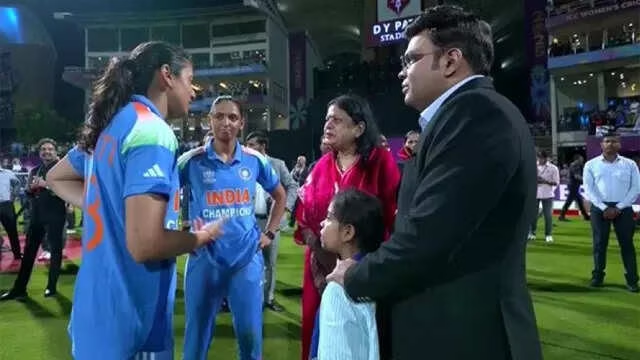In a touching display of personal pride and national celebration, ICC Chairman Jay Shah’s mother and young daughter recently spent quality time with Harmanpreet Kaur and Smriti Mandhana—India’s newly crowned Women’s World Cup-winning captain and vice-captain. The intimate gathering, held shortly after India’s historic triumph over South Africa in the 2025 ICC Women’s World Cup final, symbolized more than just a photo-op—it reflected the deep emotional resonance of a long-overdue victory.
A Personal Moment After a Historic Win
The image of Jay Shah’s mother gently placing a hand on Harmanpreet’s shoulder, while his daughter smiles beside Smriti Mandhana, quickly went viral across Indian social media. To many fans, it wasn’t just a meeting of dignitaries and athletes—it was a generational handover, a quiet acknowledgment that the sacrifices of these players had finally been seen, valued, and celebrated at the highest levels.
For years, India’s women cricketers trained with limited resources, often flying commercial flights while their male counterparts enjoyed charter luxury. Their perseverance through systemic neglect made the 2025 World Cup win not just a sporting achievement, but a cultural milestone.
From Neglect to National Pride
The 2025 ICC Women’s World Cup final wasn’t merely a match—it was a reckoning. By defeating a formidable South African side with a blend of tactical brilliance and fearless batting, Team India shattered a decades-long narrative of “almosts.” It was the nation’s first-ever ICC title in women’s cricket, and the emotional weight was evident in every post-match interview, every tear, and every embrace.
Harmanpreet Kaur, who had carried the team through tough losses in 2017 and 2022, finally lifted the trophy she’d dreamed of since childhood. Smriti Mandhana, often criticized for inconsistent form in big games, silenced doubters with a match-winning half-century in the final.
Jay Shah’s Role in the Transformation
While the spotlight rightly shines on the players, the structural reforms under Jay Shah’s leadership as BCCI Secretary—and now ICC Chairman—played a pivotal role in this redemption arc. Since 2023, the BCCI has:
- Introduced equal match fees for men’s and women’s international players
- Launched a dedicated Women’s Premier League (WPL) with record-breaking auctions
- Upgraded domestic infrastructure and centralized contracts
- Ensured charter flights and professional support staff for all women’s tours
These weren’t just policy changes—they were signals of belief. And that belief translated into confidence on the field.
Why This Family Visit Matters
The visit from Jay Shah’s mother and daughter wasn’t orchestrated for optics. In Indian culture, when elders and children alike honor someone, it’s among the highest forms of respect. That a grandmother and a young girl—representing past and future—stood beside Harmanpreet and Smriti speaks volumes about how this victory has transcended sport.
For young girls watching across villages and cities, the message is clear: cricket isn’t just a man’s game anymore. It’s their game too.
What’s Next for Indian Women’s Cricket?
With the World Cup in hand, the focus now shifts to sustaining momentum. The WPL’s third season is set to expand, and grassroots programs are being rolled out in tier-2 and tier-3 cities. More importantly, the team has earned something money can’t buy: legacy.
As fans, we may never know the full private conversations that took place during that quiet meeting between Shah’s family and the team’s leaders. But the photos say enough: a nation finally giving its heroines the embrace they’ve deserved all along.
